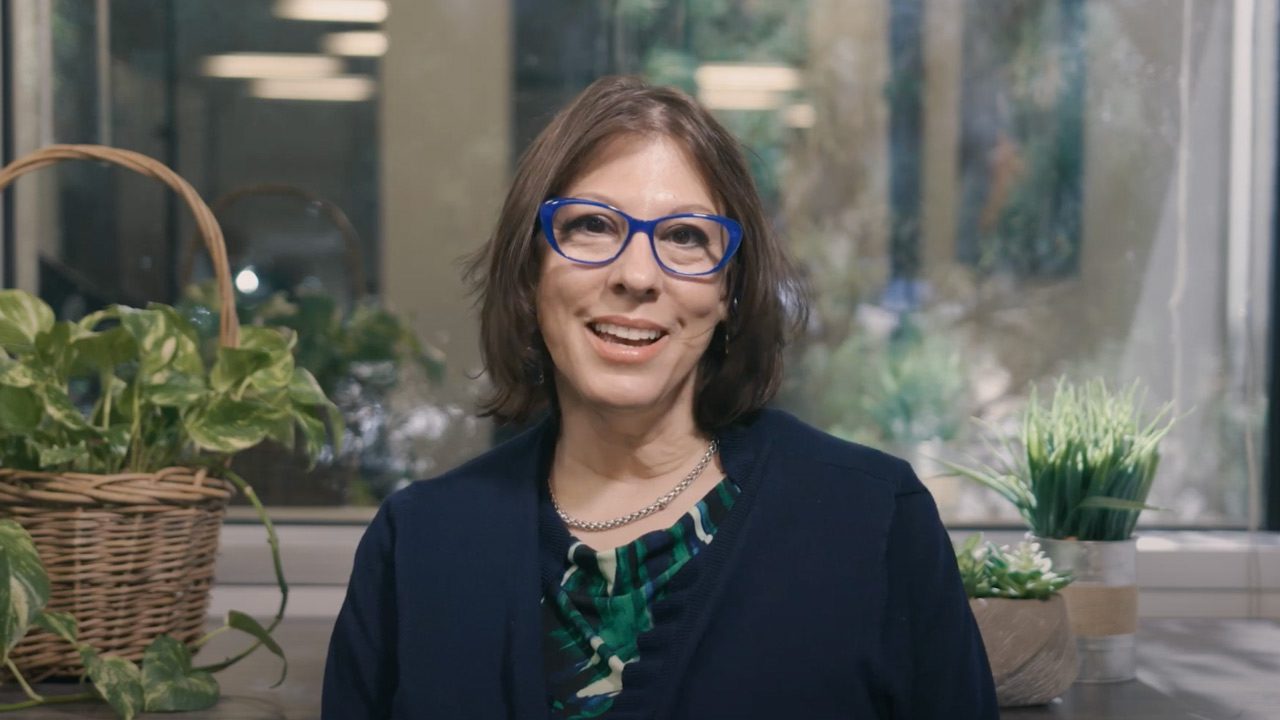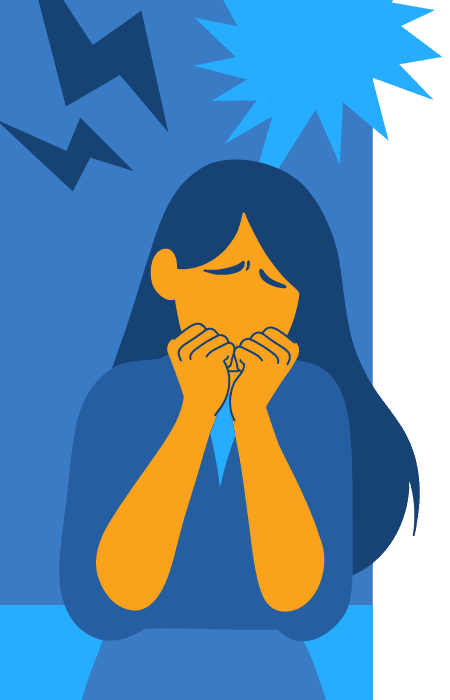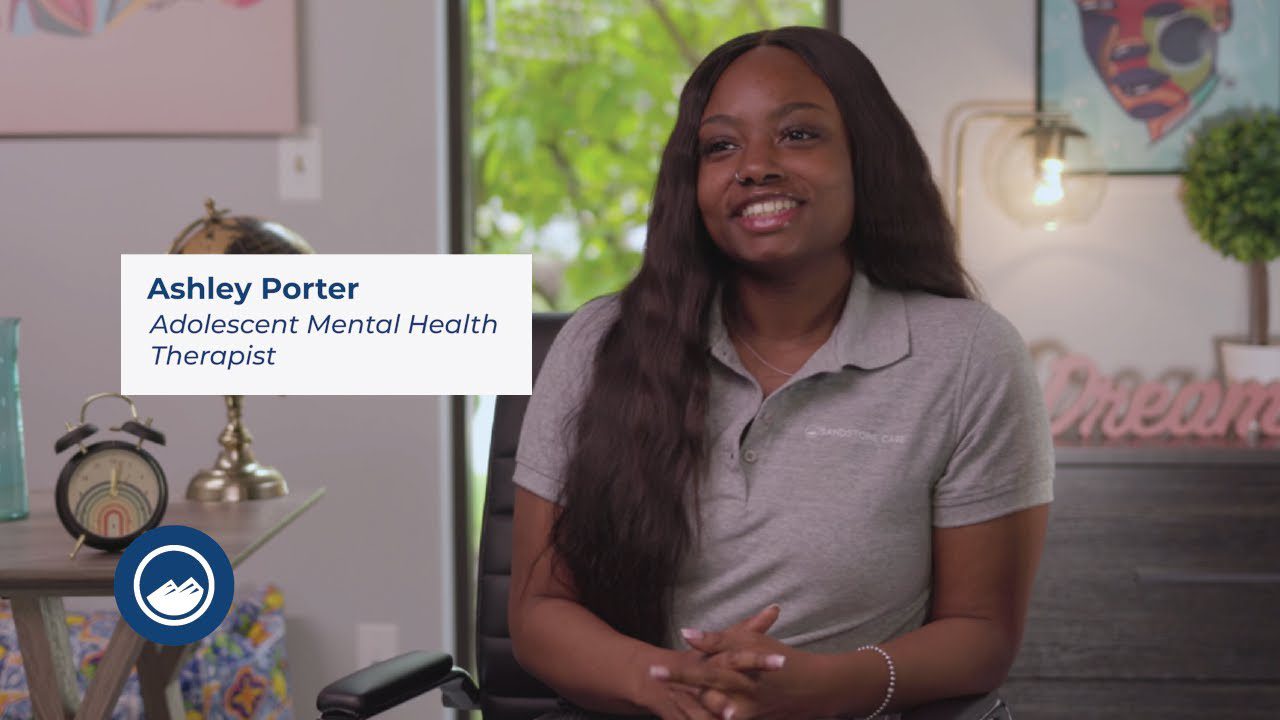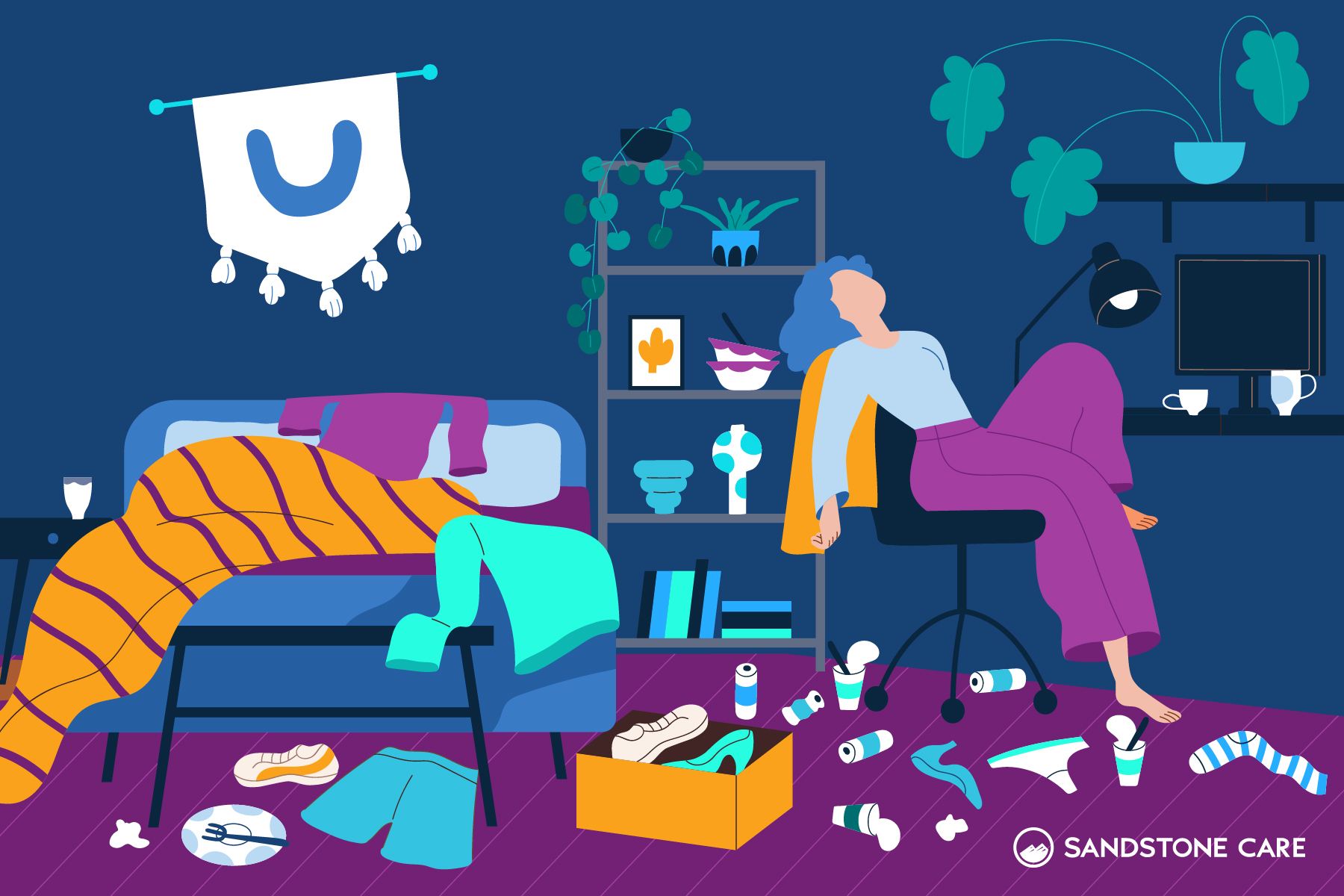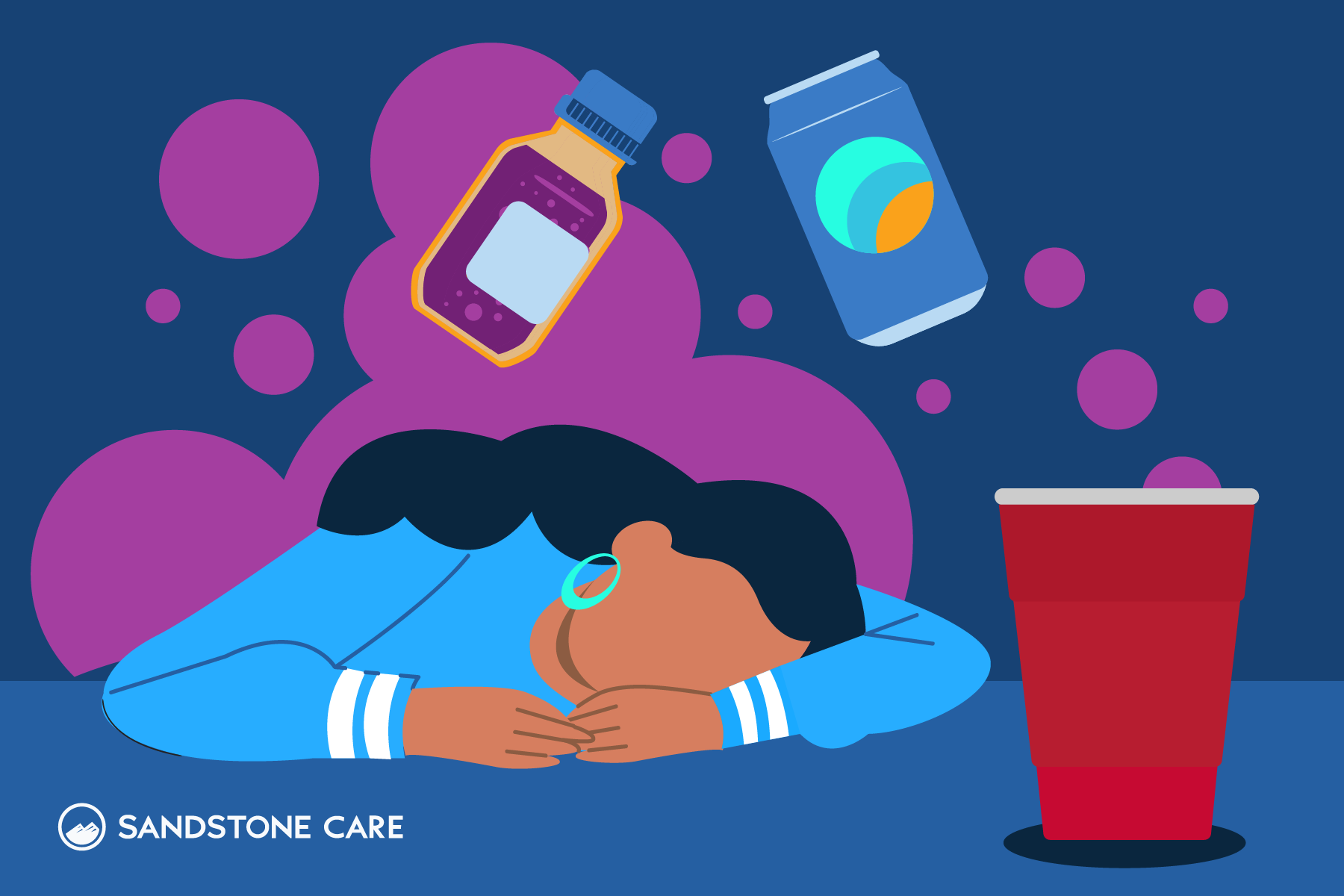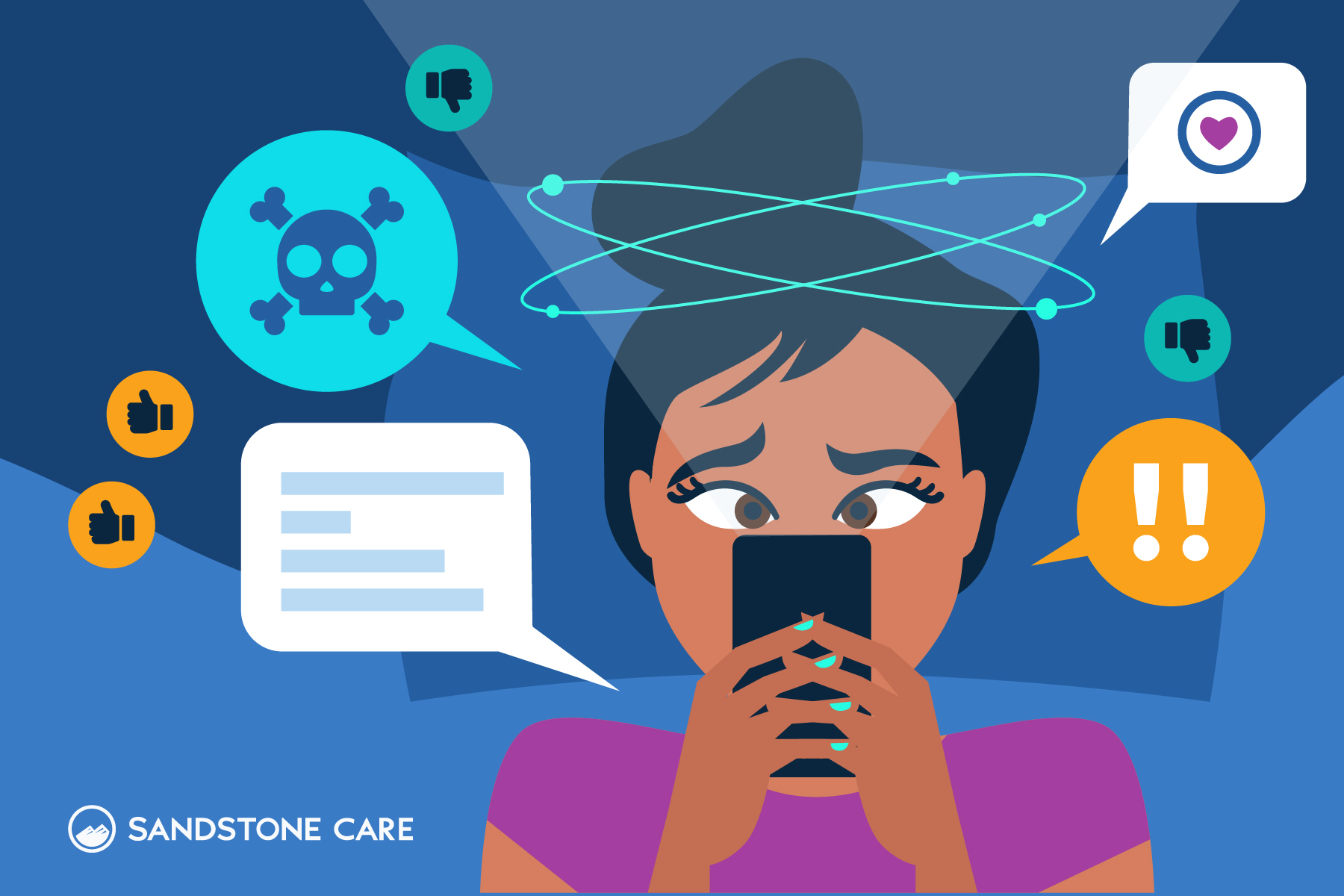Understanding the signs and symptoms of anxiety can help a person recognize when to get help.
There are a variety of different ways a person can learn to manage their symptoms and calm anxiety.
What Is Anxiety?
Anxiety involves feelings of fear, dread, and uneasiness.
When a person has an anxiety disorder, they experience anxiety that does not go away and can get worse over time, according to MedlinePlus.
There are different types of anxiety disorders, including:
- Generalized anxiety disorder
- Panic disorder
- Social anxiety disorder
- Phobia-related disorders
Why Is It Important To Manage Anxiety?
Anxiety can affect many aspects of your life, including your relationships, work, school, and physical health.
It is important to manage anxiety so that you take care of your physical and mental well-being. Anxiety can worsen over time, and some people experience severe symptoms that make it extremely hard to get through everyday life.
Do I Have Anxiety?
Why Do I Feel Anxious For No Reason?
Many people experience feelings of anxiety at times. Maybe they have a stressful event coming up or are burnt out from a busy schedule.
However, when a person feels anxious for what seems like no apparent reason, it is a good sign to reach out for help.
Anxiety can stem from anxiety disorders or could result from something else like medication, physical health conditions, or other mental health disorders.
If you are feeling anxious for no reason, it is best to seek professional help to figure out what is causing the anxiety and get a proper diagnosis and treatment.
Recognizing The Signs Of Anxiety
It is extremely important to pay attention to the signs of anxiety in yourself.
Identifying these signs can help a person learn how to change and manage them and live a more balanced and sustainable life.
What Are The Physical Symptoms Of Anxiety?
Some of the most common physical symptoms of anxiety include:
- Rapid heart rate
- Unexplained aches and pains
- Dizziness
- Shortness of breath
- Behavior changes
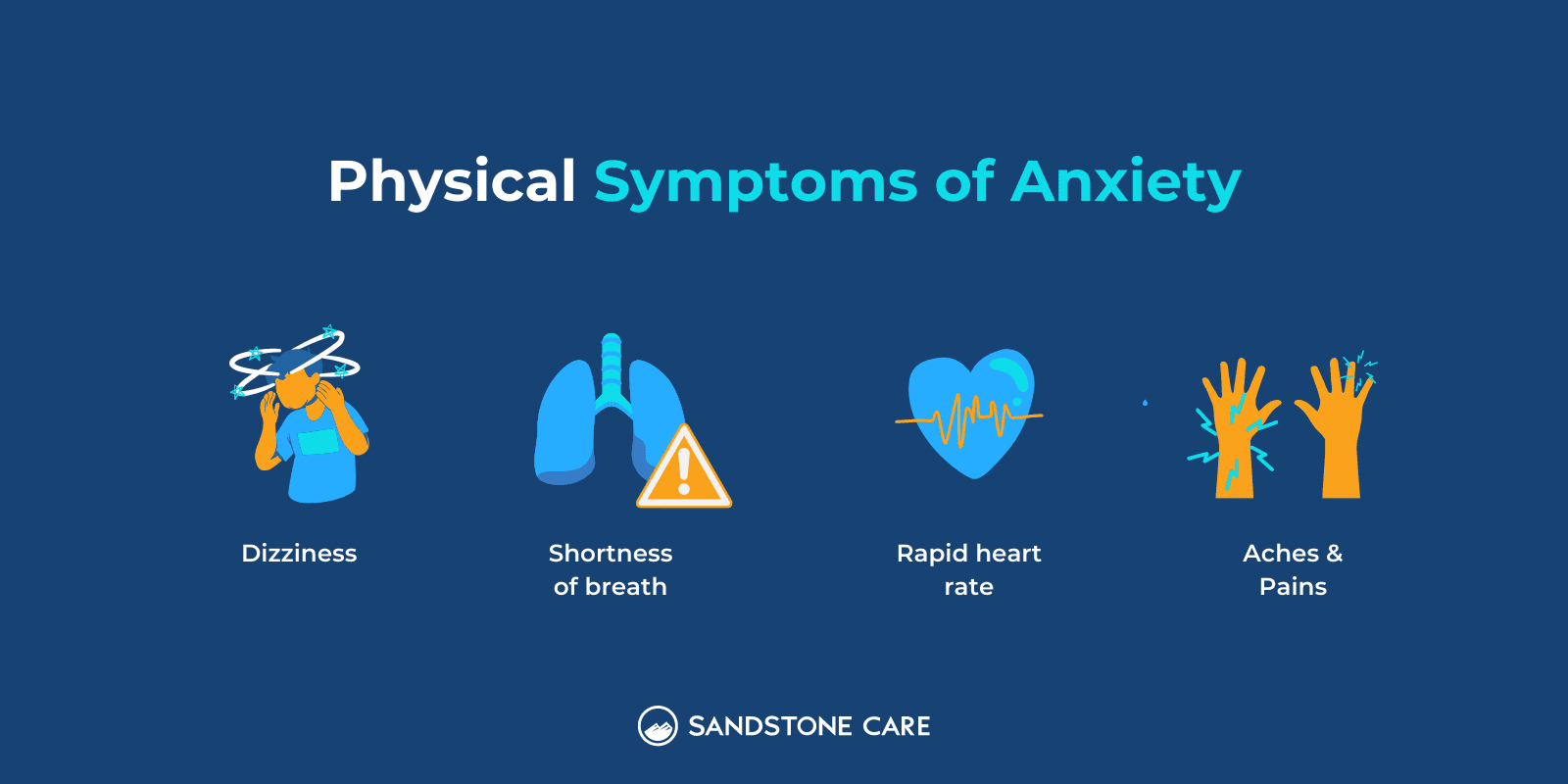
What Are The Emotional Symptoms Of Anxiety Disorder?
Emotional symptoms of anxiety disorder involve:
- Anxious thoughts or beliefs that can be hard to control
- Having difficulty concentrating
- Feelings of worry
- Restlessness and fatigue
What Are The Most Severe Symptoms Of Anxiety?
Panic disorder is a serious and severe form of anxiety.
An individual with panic disorder feels intense and often uncontrollable feelings of anxiety.
They can also experience panic attacks, which can make it hard to breathe and cause chest pain and dizziness.
What Are Three Emotional Effects Of Anxiety?
Anxiety affects the way a person thinks, feels, and acts.
Three of the main emotional effects of anxiety include:
- Feeling tense and unable to relax
- Fearing the worst
- Experiencing extreme worry and anxiousness
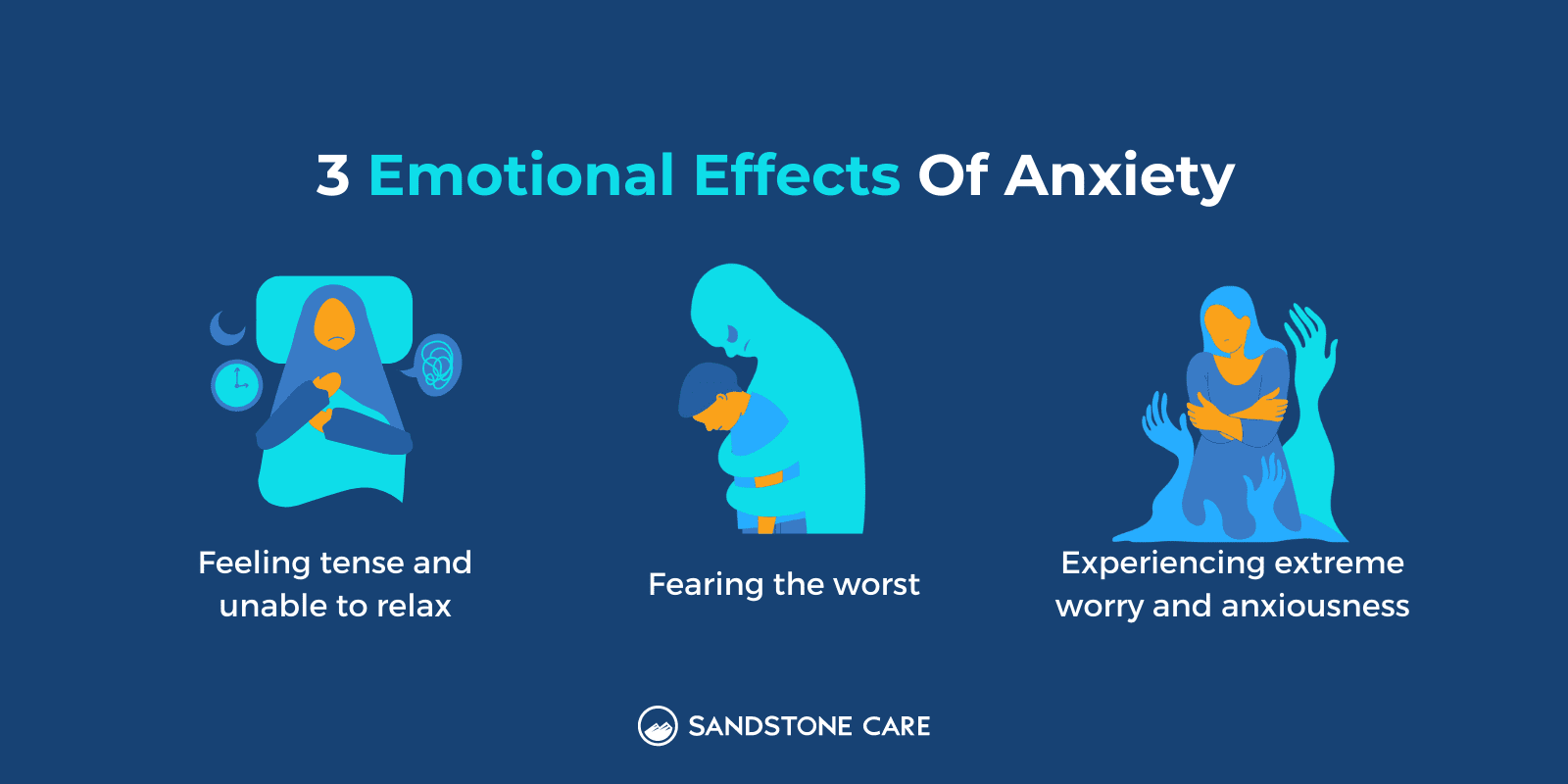
What Are Weird Symptoms Of Anxiety?
Anxiety does not look the same in each individual.
Some people may experience lesser-known symptoms of anxiety that can include:
- Perfectionism
A person may try to be a perfectionist out of fear of not being good enough. When a person becomes obsessed with trying to do everything perfectly, it may be a sign of anxiety.
- Stomach aches
Individuals with anxiety may experience regular stomach aches that have no obvious cause. Anxiety can affect the digestive system and cause nausea, stomach pains, or diarrhea.
- Indecisiveness
Anxiety can make a person extremely overwhelmed. When it comes to making decisions, it can sometimes be too overwhelming for a person with anxiety to decide.
- Difficulty dealing with stress
People with anxiety may find it hard to cope with difficult situations because it feels like everything is going wrong or the worst will happen.
Identifying Triggers

What Triggers Anxiety?
Certain events and situations can trigger the symptoms of anxiety.
Being able to identify your own triggers is so important because it can help you learn how to manage your symptoms and practice healthy ways to cope.
Every individual can have different triggers. However, some common ones can include:
- Stressful experiences
- Trauma
- Substance use, including caffeine
- Unhealthy or unorganized environment
- Lack of sleep
- Money troubles
- Social events
- Work or school
- Conflict
- Health problems
- Current events in the world
What Does An Anxiety Trigger Feel Like?
When a person is faced with a specific event or action, it can lead to worry and fear.
Anxiety triggers can feel different for each person.
Sometimes, anxiety triggers can cause a person to experience a panic attack.
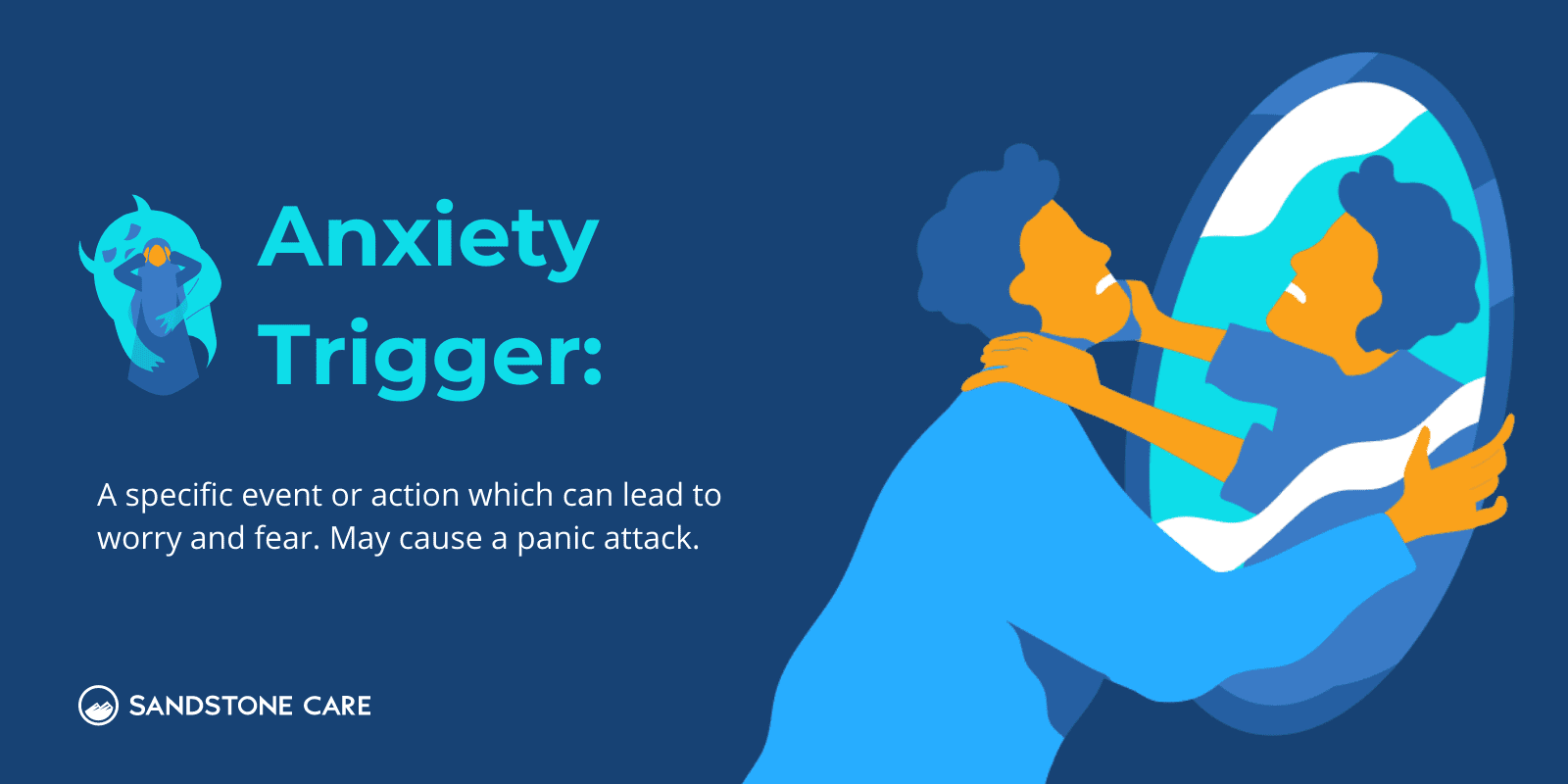
How Can I Stop My Anxiety From Triggering?
The first step to stopping your anxiety from triggering is being able to identify what your triggers are.
Once you know this, you can take the steps to manage these triggers and cope with the symptoms of anxiety.
Some ways you can stop your anxiety from triggering include:
- Practicing meditation and mindfulness
- Getting physical activity to reduce stress
- Get good sleep and rest
- Spend time outside
- Eat a balanced diet
- Practice breathing exercises
- Find support through family and friends
- Identifying and working through your feelings through exercises like journaling
What Can Make Anxiety Worse?
Some things that can make anxiety worse include:
- Caffeine
- Messy or unorganized environment
- Being around negative people
- Money troubles
- Social events
- Conflict
- Work or school
- Neglecting self-care
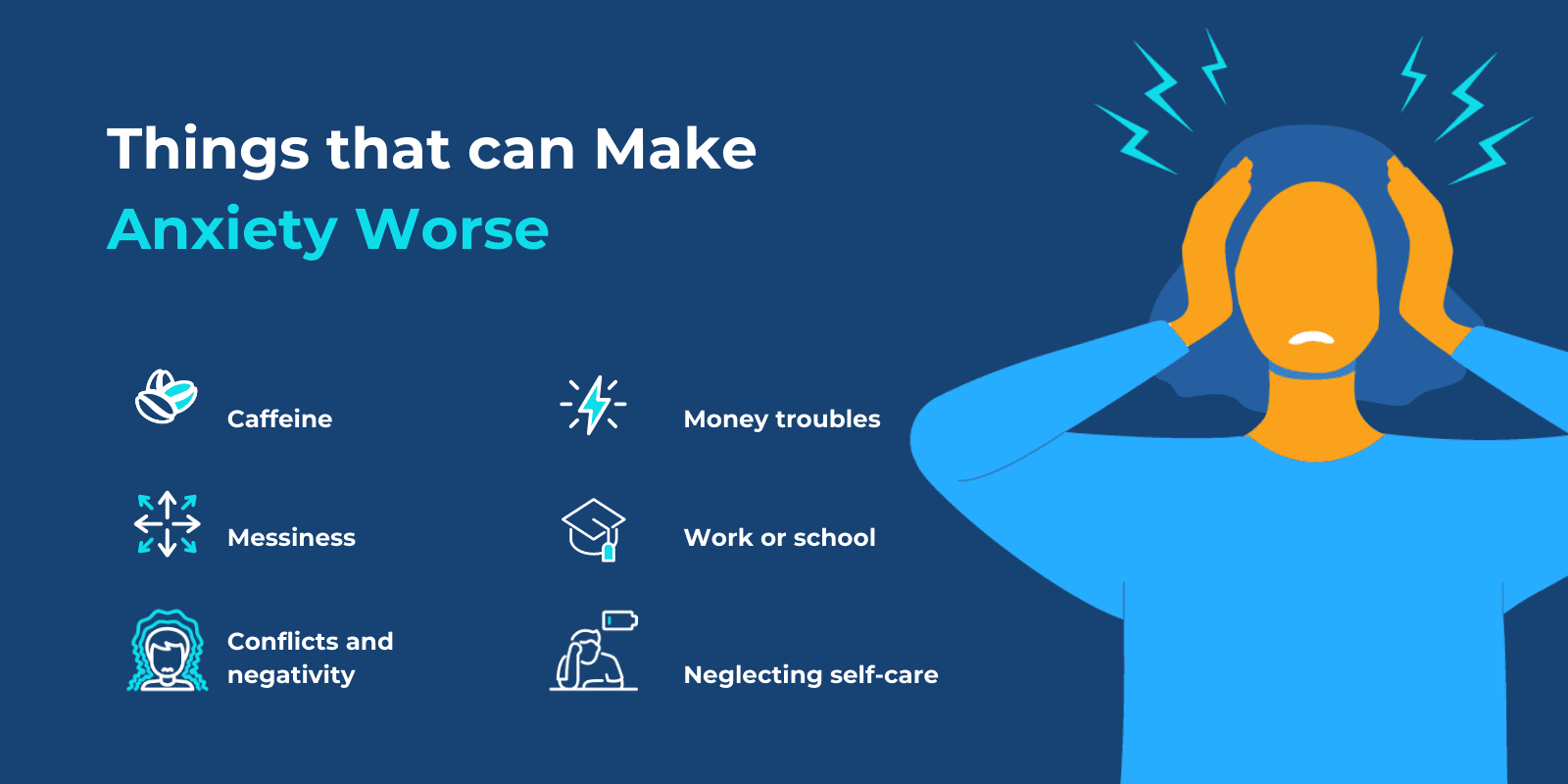
What Should You Avoid If You Have Anxiety?
There are some things you may want to avoid if you are experiencing symptoms of anxiety.
This can include:
- Caffeine
- Substance abuse
- Processed foods
Strategies For Managing Anxiety
What Are Coping Strategies For Dealing With Stress And Anxiety?
Some coping strategies you can use for dealing with stress and anxiety can include:
- Deep breathing exercises
- Mindfulness techniques
- Progressive muscle relaxation
- Guided imagery
- Exercise
- Journaling
- Spending time in nature
- Social support
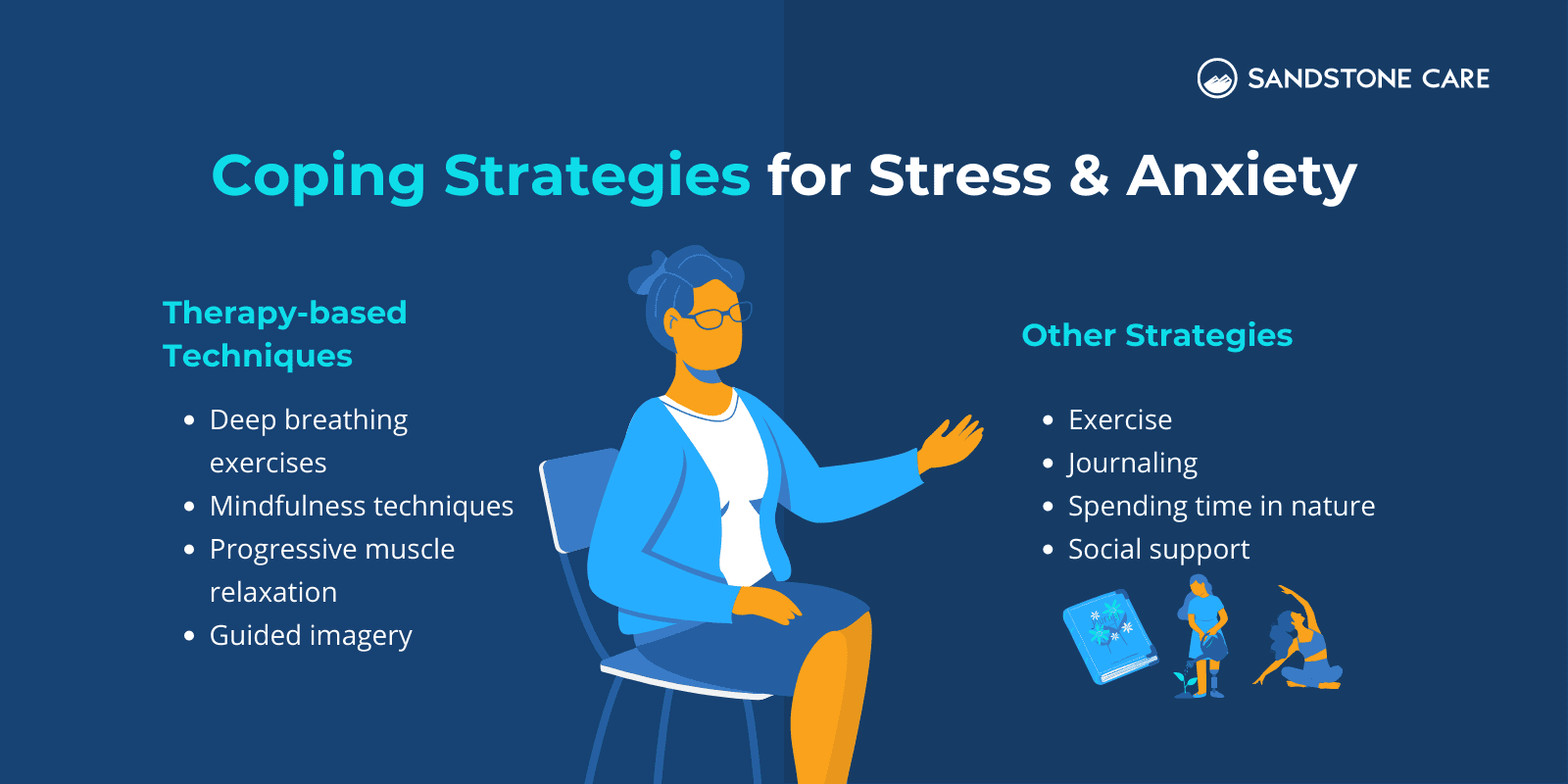
How Can I Improve My Crippling Anxiety?
One of the main ways to improve your crippling anxiety is by talking to someone and getting professional support.
Therapy can be very helpful for individuals with anxiety to learn how to manage their symptoms and improve their anxiety.
How Can I Quickly Calm My Anxiety?
Anxiety can become very overwhelming very fast.
Some ways a person can quickly calm their anxiety include:
- Taking deep breaths and doing breathing techniques
- Identify what you are feeling and thinking
- Try to 5 4 3 2 1 coping technique
- Take a cold shower
- Go outside
- Talk to someone
What Is The 5 4 3 2 1 Coping Technique?
The 5 4 3 2 1 coping technique can be used to help a person experiencing anxiety calm down.
You start by naming 5 things that you see around you.
Then, 4 things you can touch, 3 things you can hear, 2 things you can smell, and 1 thing you can taste.
This technique can help a person be more mindful and live in the present moment while also calming down their system and practicing slow breathing.
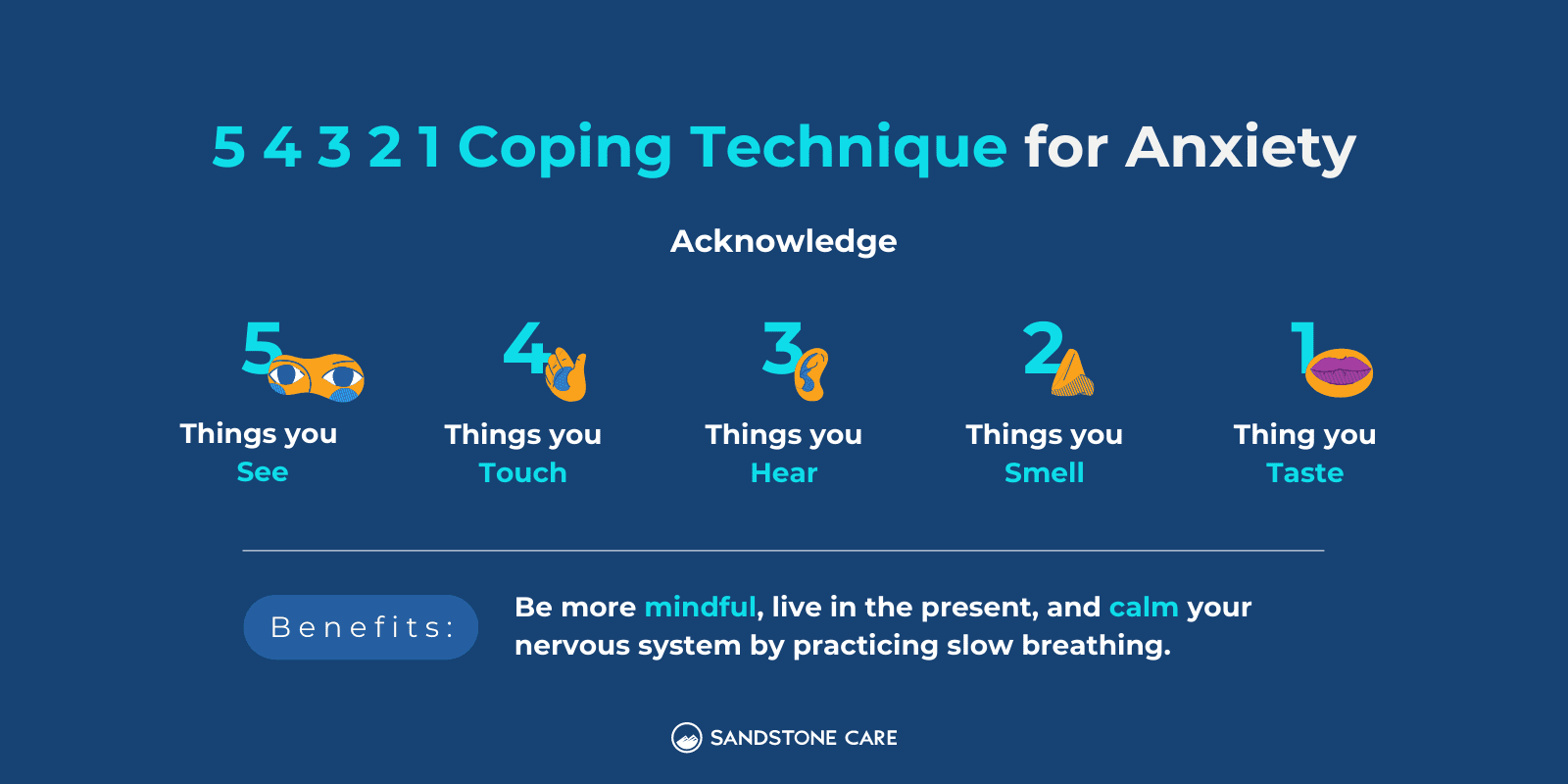
What Is The 3 3 3 Rule?
The 3 3 3 rule can be a helpful tool for someone trying to manage their anxiety symptoms.
It works by naming 3 things you can see, 3 things you can hear, and moving 3 parts of your body.
The 3 3 3 rule focuses on grounding a person’s emotions and gets you to focus on the present to help you find some relief from anxious feelings.
What Is The Stop, Drop, And Roll Technique For Anxiety?
The stop, drop, roll technique for anxiety goes as follows:
- Stop
Stop and identify what is happening both internally and externally. Notice what you are feeling, thinking, or doing.
- Drop
“Drop” means to slow down. You can try practicing some breathing exercises, and also drop the negative thoughts you were having and replace them with more positive ones.
- Roll
“Roll” means to keep going on. Carry out what you were doing, and adapt to the situation.
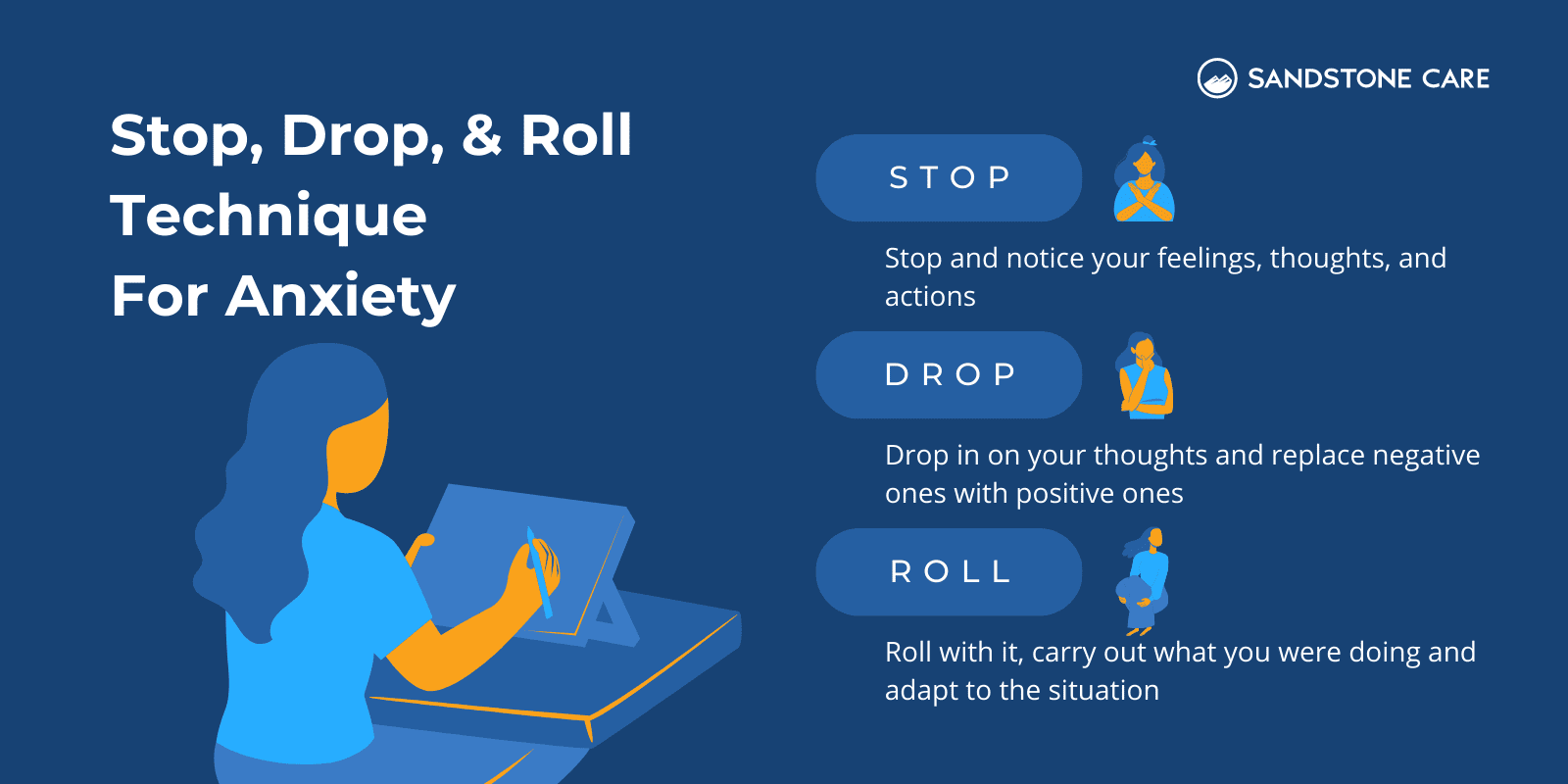
Self-Care Practices To Reduce Anxiety
What Are The Coping Skills For Anxiety?
Some of the main coping skills for managing anxiety include:
- Getting physical exercise
- Eating a balanced diet
- Avoiding alcohol and substance use
- Getting good sleep and rest
- Cutting back or quitting caffeine
- Using relaxation techniques
- Meditating
- Journaling
- Going to therapy
- Staying connected with family and friends
How Do You Build Resilience Against Anxiety?
Practicing healthy habits and creating a good routine can help give you the tools to manage stress and build resilience against anxiety.
Building resilience against anxiety also starts with identifying your triggers, understanding what is happening, and seeking help.
A strong support network can help you build resilience against anxiety.
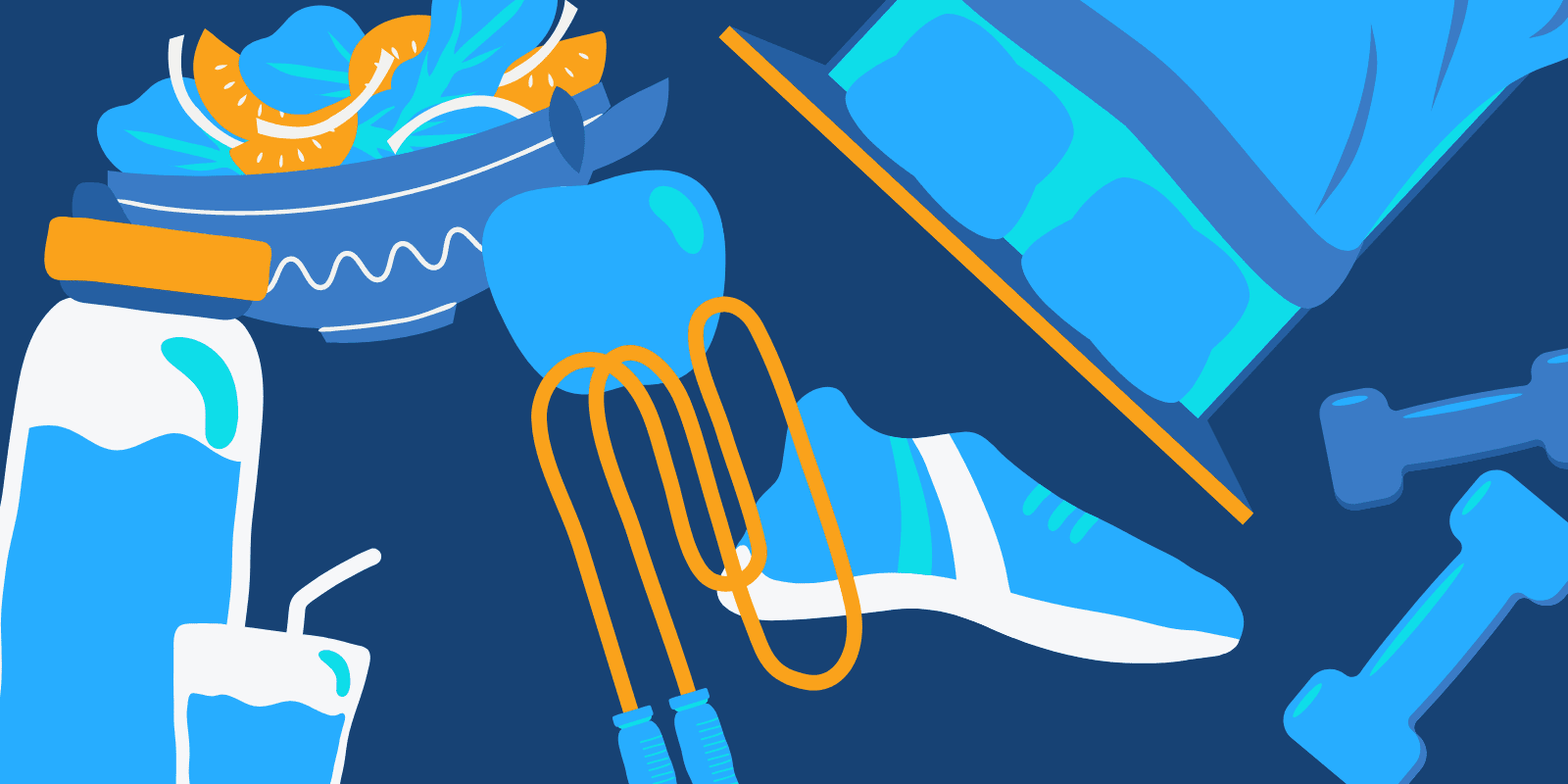
How Do You Take Pressure Off Yourself?
Many people’s symptoms of anxiety become triggered when they experience a lot of pressure or stress.
But one way to eliminate that pressure is to remember that you are human and nobody is perfect. Be patient, be kind to yourself, and give yourself a break when needed.
Taking the pressure off of yourself can also mean that you learn how to not put too much on your plate. Sometimes, people tend to overwhelm themselves because they want to do well and want to get things done. But, it is important to manage your time and know when you need rest.
A big part of getting rid of pressure is also being able to recognize what you can and cannot control. Some things are out of your control, and when you begin to accept that, you can find some relief and peace.
What Foods Calm Anxiety?
Many people find some relief in their anxiety when they change their diet and start eating more healthy, balanced foods.
According to Frontiers in Psychiatry, there are a variety of nutritional interventions that may be helpful in managing anxiety disorders, which can include:
- Avoiding artificial sweeteners and gluten
- Eating foods with omega-3 fatty acids and turmeric
- Supplementing with vitamin D
- Ketogenic diets
It is extremely helpful to consult with your healthcare provider to get some guidance on starting a new diet and figuring out which foods are best for you to eat.
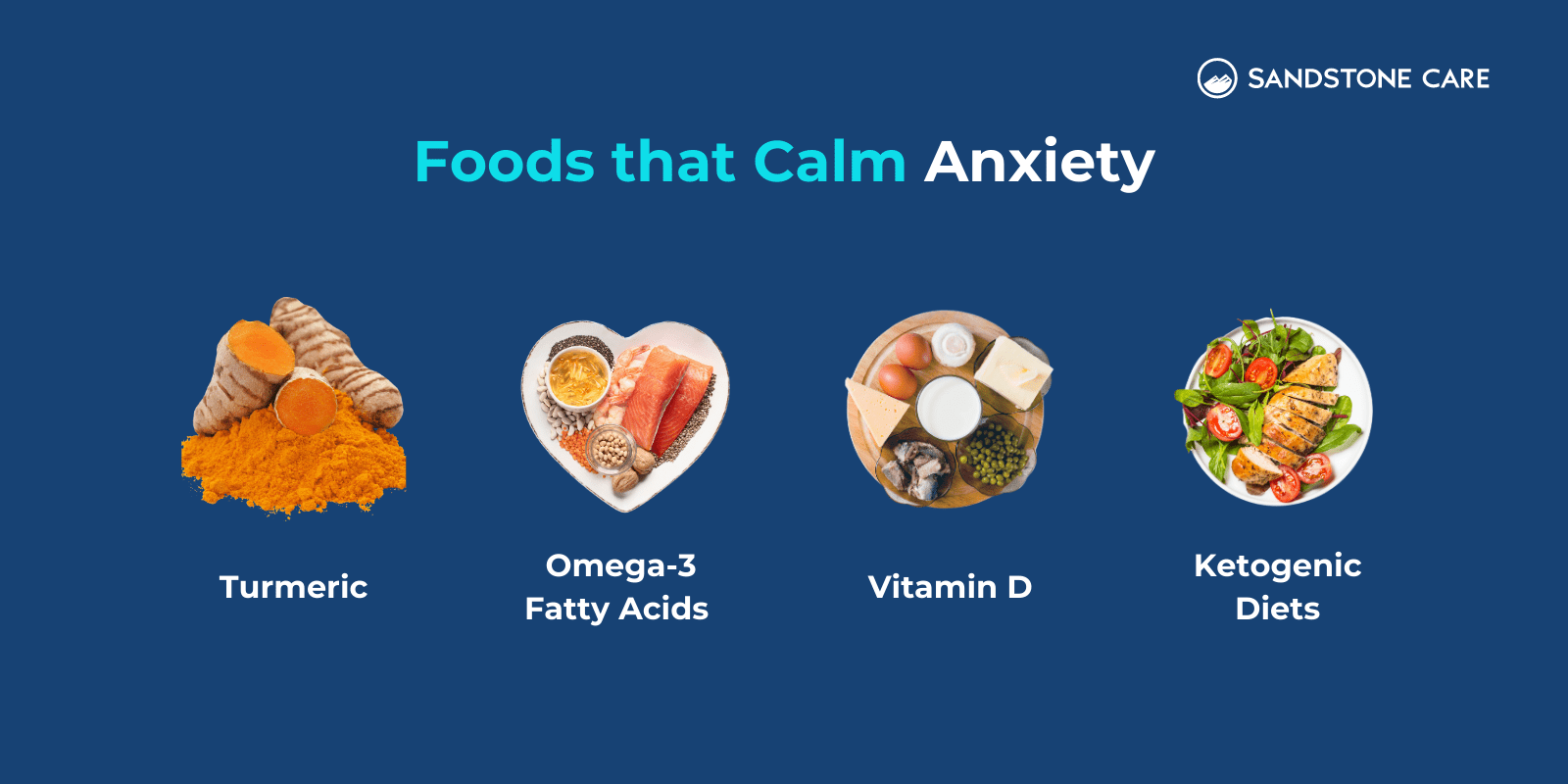
How Can I Cure Anxiety Naturally?
Some ways you can cure anxiety naturally can include:
- Staying active
- Spending time outside
- Eating a healthy, balanced diet
- Getting good rest
- Avoiding caffeine and substance use
- Meditating and practicing mindfulness
If you are thinking of taking any herbal remedies or supplements to help with your anxiety, you should consult with your healthcare provider to make sure it is safe for you.
How Do I Deal With Anxiety Without Medication?
Many people are able to deal with their anxiety without the need for medication.
One of the main ways to deal with anxiety without medication is by implementing healthy lifestyle changes. This can include your sleep habits, eating habits, and daily routine.
The other major way to deal with anxiety without medication is by going to therapy.
There are different types of professionals that can help a person with anxiety, including therapists, psychiatrists, and other mental health professionals.
Many therapists use psychotherapy, also known as talk therapy, to help teach people healthy coping skills and ways to identify and change negative thought patterns.
Cognitive behavioral therapy (CBT) is a common and effective therapy that refers to a wide variety of treatment approaches used for mental health and substance use disorders.
CBT can help a person learn how their thoughts, feelings, and behaviors are all connected and teach them how to restructure them in a healthy way.
Self-care Tips
Taking care of yourself can look different depending on each individual.
According to the National Institute of Mental Health, self-care means that you do things that help you live well and improve your overall physical and mental health.
Some of the most common self-care tips a person can use to help manage their anxiety and improve their mental health can include:
- Getting exercise on a regular basisEven just walking for 30 minutes a day can help improve a person’s mood and health.
- Eating well and staying hydratedCertain foods can help a person find some relief from anxiety. A balanced diet and drinking water can help a person’s health, energy, and focus.
- Getting good restGetting a good amount of sleep and also reducing blue light exposure before bedtime can help you stick to a schedule and feel better the next day. Try to limit phone, computer, and tv time before going to sleep.
- RelaxationIt is important to do things that are relaxing and to take a break when you are feeling stressed or overwhelmed. This can possibly include meditation, muscle relaxation, journaling, listening to music, or practicing breathing exercises.
- Practicing gratitudeReminding yourself of the things you are grateful for can put you in a happier mindset and give you peace and motivation. You can write these things down, think of them throughout the day, or even say them out loud.
- Setting boundaries, goals, and prioritiesPart of taking care of yourself means that you recognize what you need, enjoy, and are okay with. Being able to say “no” is a big accomplishment and can help you protect your mental health.
- Staying connected with friends, family members, and communityAnxiety can make a person want to isolate themselves. When you stay connected with loved ones, you have a support system you can go to for help. It is important to know that it is okay to reach out for help and that you are not alone.
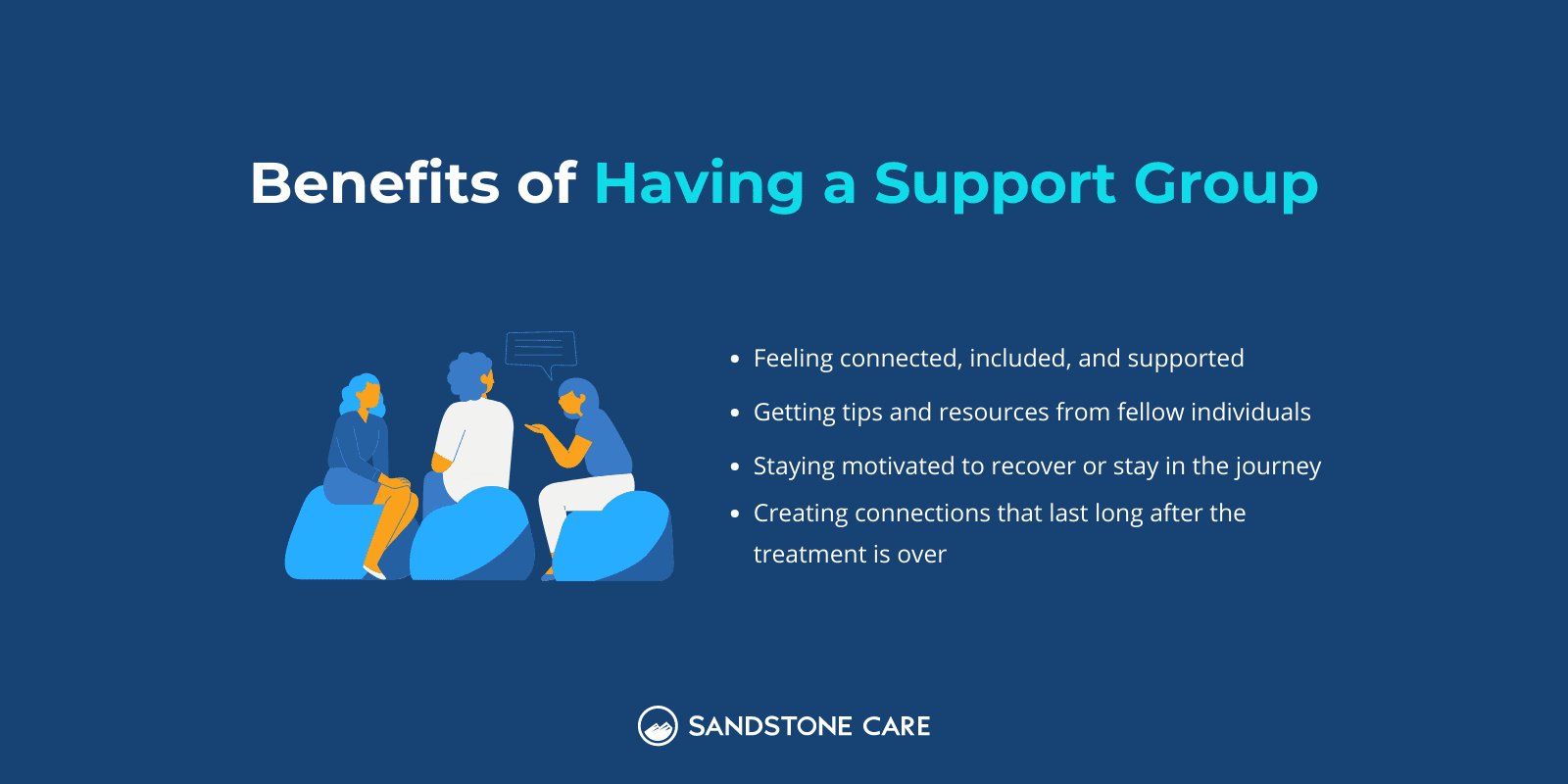
Seeking Professional Help
At What Point Do You Seek Help?
If you feel that you may be experiencing even mild symptoms of anxiety, it is best to seek professional help.
How Do You Know When Anxiety Is Serious?
When anxiety has begun to interfere with your daily life, it is a sign to reach out for professional help.
If you are starting to recognize that your anxiety has affected your work life, school life, personal life, daily activities, relationships, and overall well-being, it is time to talk to someone.
When Is Anxiety Just Too Much?
Sometimes, people think that anxiety will just go away, but then it worsens over time.
Signs that anxiety has gotten to be too much is when it is affecting you, your everyday life, and your well-being.
A person with anxiety that has gotten to be too much will often feel exhausted, overwhelmed, tense, stressed, and sometimes helpless.
It is important to know that anxiety is manageable, and there are many ways to treat it and cope. Know that you are not alone and that there is help for you.
What Happens If Severe Anxiety Is Left Untreated?
If severe anxiety is left untreated, the symptoms can worsen over time and cause physical health problems and relationship problems and can become debilitating to the point where it feels impossible to do small, everyday tasks.
Getting help and treatment can give you the tools to improve your health and heal. Sometimes, asking for help can be scary, but know that you are not alone.


Let’s take the next steps together
Anxiety can affect the way a person thinks, feels, and acts. It is important to get help and manage anxiety to take care of your physical and mental health. Sandstone Care is here to support teens and young adults with mental health and substance use disorders.

